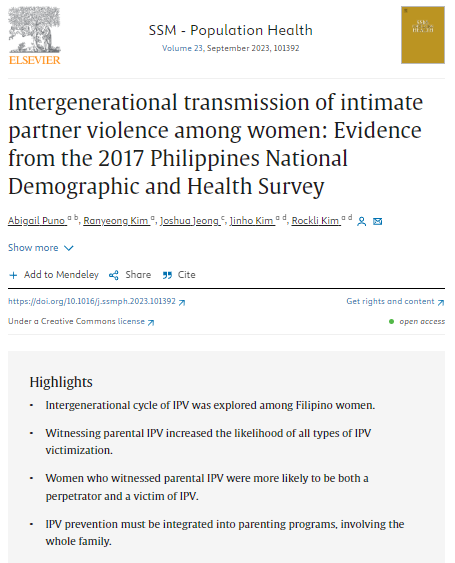Filipino women exposed to violence between their parents are likely to be both a perpetrator and a victim of intimate partner violence
24 Nov 2023

Violence can be transferred from one generation to another through social learning. Social learning theory posits that behaviors and values about interpersonal dynamics are learned by observing influential role models in society, such as parents, and that these values and behaviors are similarly reproduced. Considering these theories in the family context, exposure to violence between parents might influence children’s attitudes and values on the acceptability of such behaviors and their consequences in intimate relationships.
The study done by Puno et al. (2023) digs deeper into the reality of the influence of exposure to family violence in the Philippines, specifically the father’s violence against the mother. Using the 2017 Philippines National Demographic and Health Survey dataset of 12,248 currently in-union (married or cohabiting) women aged 15 to 49, the study sought to provide insight into the question, “If a person sees their father physically beating their mother, would they also be involved in intimate partner violence (IPV) in their relationships in the future?” Statistical analyses were performed to assess if there is a link between exposure to parental IPV and women’s odds of being victims and/or perpetrators of IPV themselves. The results showed evidence of intergenerational transmission of IPV wherein women exposed to parental IPV are more likely to be victims of all types of IPV: physical, sexual, and emotional violence. These women are also more likely to perpetrate physical violence against their husbands. When examined jointly, most Filipino women exposed to violence between their parents were both victims and perpetrators (i.e., report a combination of victimization and perpetration) of IPV in their relationships, which can lead to re- victimization and severe consequences for women. The integration of violence prevention within parenting and community programs can be considered to prevent the perpetuation of the intergenerational cycle of IPV.
Most research on this topic, specifically in the context of intimate partner violence (IPV), has been concentrated in high-income countries’ context and much less is known for low- and middle- income countries such as the Philippines. This research is the first account of the intergenerational transmission of violence among women using a nationally representative sample of the Philippines.
Read the full article: https://www.sciencedirect.com/science/article/pii/S2352827323000575?via%3Dihub
